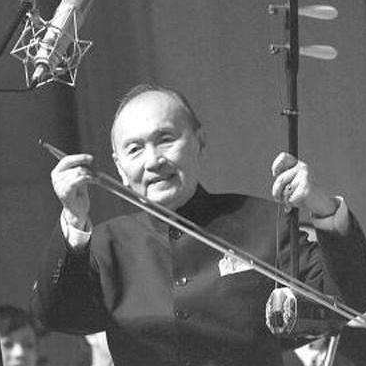Tang Liangde

Tang Liangde, originally from Shanghai, grew up in a musical family. Famous erhu performer, educator, composer and conductor.
Tang Liangde learned to play various ethnic musical instruments since he was a child. As early as the early 1950s, he had already participated in the "Tang Family Class" Chinese Orchestra organized by his grandfather and father, and played the erhu and pipa solo. In 1953, he joined the Shanghai Chinese Orchestra and often performed with the famous flute player Lu Chunling. In 1956, Tang Liangde was hired by the Beijing New Film Orchestra (now the China Film Orchestra), and successively served as the principal of Erhu, the deputy principal of the orchestra, the leader of the classical music and Jiangnan Sizhu groups, the principal of the light music band, the acting principal of the orchestra, and the acting conductor. Engaged in composition and music education. His works include drama music, film soundtracks, erhu solos, Chinese music ensembles, and the Erhu Performance Method co-edited with Zhang Shao.
At the end of September 1977, Tang Liangde settled in Hong Kong and was employed by the Hong Kong Chinese Orchestra as the Acting Principal of the Orchestra, and later became the Senior Music Officer (Chinese Orchestra) of the Music Office, and was the principal of the Hong Kong Youth Chinese Orchestra and the Music Office Mentor Chinese Orchestra. command. He has led the Hong Kong Youth Chinese Orchestra in public performances in the UK, France, Cyprus, Israel, Singapore and Canada. In addition, he has been invited to collaborate with several Chinese orchestras as conductor and erhu soloist more times, and he is also a guest erhu tutor in the Department of Chongji Music of the Chinese University of Hong Kong. For his outstanding achievements in music education over the years, Tang Liangde was awarded the 1991 Hong Kong "Art Educator" Award by the Hong Kong Artists Union.
Tang Liangde has held many positions in the society, including honorary director of the Chinese National Orchestra Association and member of the Huqin Expert Group, consultant of the Beijing Pipa Research Association, artistic consultant of the Hong Kong Chinese Orchestra, chairman of the Preparatory Committee of the Hong Kong National Orchestra Association, and the Hong Kong Chinese Instrumental Music Assessment Association. Music director and artistic director of Chang and Bauhinia Chinese Music Collection, honorary consultant of Hongguang Chinese Orchestra and Xinsheng Chinese Orchestra.
 渝公网安备 50010702504639号
渝公网安备 50010702504639号